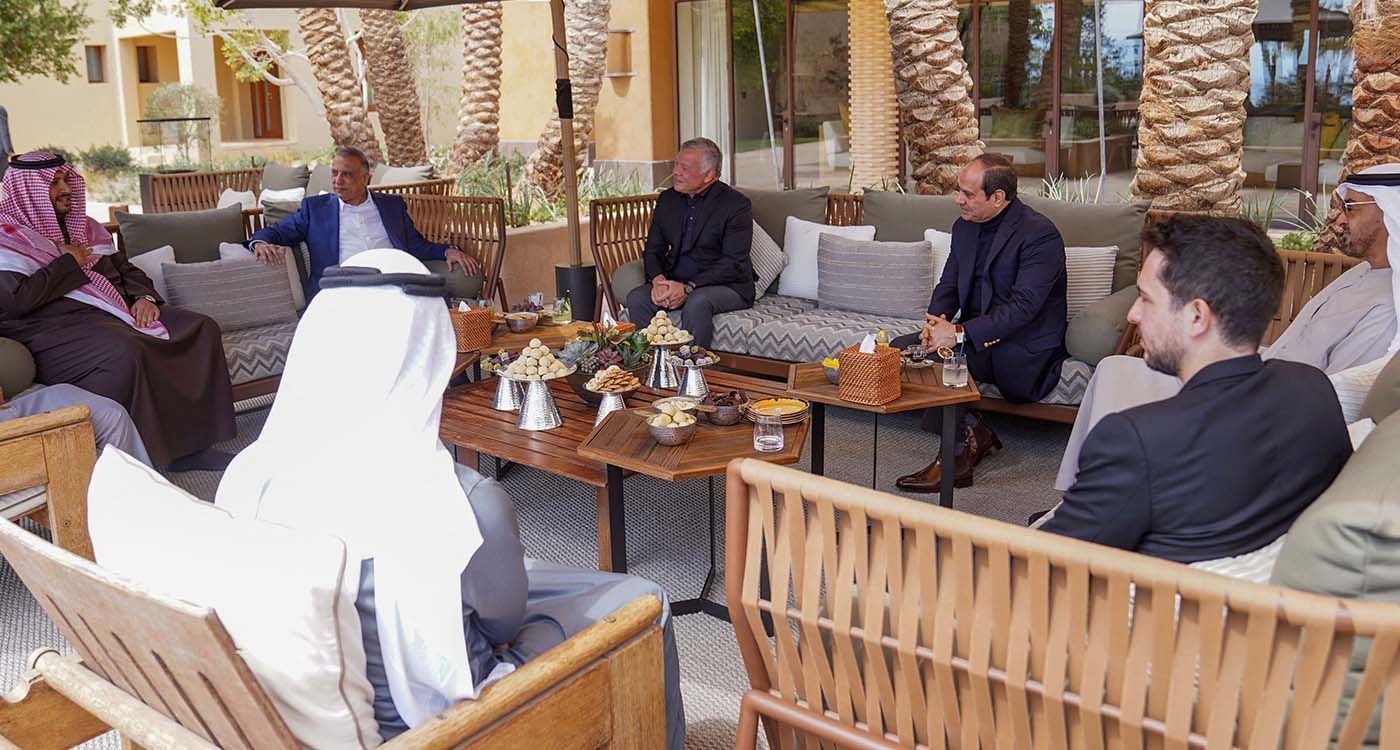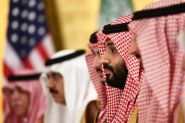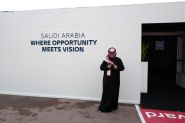- Home
- Highlights
- Saudi Arabia, Egypt, and the Emirates: The Anti–Muslim Brotherhood Crusade

©Yousef ALLAN / Jordanian Royal Palace / AFP
Below is an investigation into these regimes’ shared strategy to eradicate the influence of the Muslim Brotherhood, combining domestic repression, media campaigns, and diplomatic pressure.
Among the major ideological fault lines in the Arab world, few are as decisive as the one between conservative authoritarian and self-proclaimed “secular” regimes and the Muslim Brotherhood. Today, Saudi Arabia, Egypt, and the United Arab Emirates form the core of a determined anti-Islamist front, seeking to neutralize the Brotherhood’s influence both at home and across the region.
Since the July 2013 military coup in Egypt, which ousted Muslim Brotherhood affiliated President Mohamed Morsi, Cairo has launched a fierce crackdown on the Brotherhood: mass arrests, swift trials and death sentences. The movement is now officially classified as a “terrorist” organization in the country. This hardline stance is fully backed by Riyadh and Abu Dhabi, who fear the popular appeal of a political Islam that competes with their own monarchical or authoritarian models, forming a counter-revolutionary axis.
Riding the wave of the 2011 Arab uprisings, the Muslim Brotherhood experienced unprecedented growth. In Egypt, Tunisia, Morocco, and Yemen, their local branches seized the opportunity presented by political vacuums to establish themselves as major forces. This rise was seen as an existential threat by certain capitals, which feared the spread of democratic contagion and a challenge to their legitimacy.
The United Arab Emirates was the first to make the fight against the Muslim Brotherhood a central pillar of both its domestic and foreign policy. Under Mohammed bin Zayed, Abu Dhabi identified the Brotherhood as an existential threat to the stability of Gulf monarchies. The strategy combines internal repression, ideological warfare, and a media offensive: arrests of local Islamists, funding international campaigns portraying the Brotherhood as terrorists, and promoting a security-focused discourse that champions a non-political “state Islam.”
Saudi Arabia, however, has long had a more ambiguous relationship with the movement. In the 1950s and 1960s, the kingdom hosted Muslim Brotherhood cadres fleeing Nasser, who went on to influence its religious and educational institutions. But the rise of Mohammed bin Salman, appointed crown prince in 2017, changed the equation: he advocates a controlled state Islam, centered on loyalty to the ruling power, authoritarian modernization, and a break with the Brotherhood’s legacy.
A year later, Riyadh designated the Muslim Brotherhood as a terrorist organization. Since then, the kingdom has carried out a systematic purge of their networks, including arrests of preachers, an overhaul of school curricula, and strict control over the religious sphere. This rupture marks an ideological turning point. Together with the Emirates, the kingdom now positions itself as a leader of modernizing authoritarianism, presenting stability and development as alternatives to any political expression of Islam.
According to political scientist Sarah Ben Néfissa, this rejection is driven more by politics than religion: “There is no fundamental difference between the ideological foundations of Salafi-Wahhabism [the dominant strand in Saudi Arabia] and the Muslim Brotherhood. What Saudi Arabia and the Emirates oppose is the Brotherhood’s political dimension, rooted in the caliphal myth and the Islamic Umma, which positions them as potential contenders for power.”
In Egypt, the issue takes on an identity dimension. “For Egypt, which experienced early political, social, and cultural modernization, the fight against the Muslim Brotherhood is an existential and identity-based struggle,” she adds.
Regional and International Pressure
The war against the Muslim Brotherhood also plays out on the diplomatic front. The Cairo–Riyadh–Abu Dhabi trio has leveraged its economic weight to influence Western positions. In 2014, this strategy sparked a serious crisis with Qatar, which was accused of supporting the Brotherhood, and led to the blockade of the small emirate by its Gulf neighbors.
Turkey has long served as a safe haven for the Brotherhood, hosting their exiled political and media network. However, as Ms. Ben Néfissa points out, the balance has shifted: “Even before Recep Tayyip Erdogan’s official visit to Egypt in February 2024, Ankara asked the Muslim Brotherhood members based in Turkey to halt their political and media attacks against Sisi’s regime.” Young dissidents, however, particularly those inspired by Mohamed Kamel, continue to benefit from some tolerance from Turkish authorities.
Even in Qatar, long considered the Brotherhood’s main ally, solidarity has weakened. “The Egyptian Muslim Brotherhood’s inability to remain in power for more than a year was a major disappointment, even for their Qatari allies,” notes the researcher.
However, Saudi Arabia and the Emirates are waging an open war against the Brotherhood, notably through the funding of research centers and media networks around the world. The aim is to impose the narrative of a terrorist organization whose ideology is deemed incompatible with regional stability.
A Battle of Narratives
The battle also plays out on symbolic and media fronts. Transnational channels such as Al-Arabiya and Sky News Arabia, funded by Riyadh and Abu Dhabi, contribute to shaping a narrative that links the Brotherhood to terrorism. In Egypt, this phenomenon is particularly pronounced. “Egyptian media have played a major role in shaping this narrative,” observes Ms. Ben Néfissa.
This battle of narratives extends beyond the Arab world. In Europe, several governments have hardened their stance toward the Brotherhood amid widespread fears of radical Islam. Yet, according to the researcher, this approach is dangerous: “Repressive policies are counterproductive… both in the countries of the region and in European states, which seem determined to mount an anti–Muslim Brotherhood offensive.”
She points out that the rise of political Islam in Europe was also fueled by the Gulf’s religious strategies: “The Islamization of French and Belgian suburbs took place in plain sight of public authorities, driven by the religious diplomacy of Gulf states through mosque construction and satellite TV channels in the 1990s. The Brotherhood became intertwined with these dynamics, but they were far from being their main protagonists.”
Declining Popular Support
The Arab Spring gave the Brotherhood a historic opportunity, but it quickly slipped away. Their brief time in power in Egypt (2012–2013) ended in a brutal ousting and a loss of credibility.
“The Egyptian Muslim Brotherhood is now viewed with a measure of condescension,” notes the researcher. Their reputation has suffered from their inability to govern sustainably.
Regionally, the Brotherhood has sought to leverage solidarity with the Palestinian cause. But, according to Ms. Ben Néfissa, this effort has fallen short:
“Their leaders are trying to ride the wave of solidarity with the Palestinian cause to return to the forefront… but so far, it has not worked.”
Towards Lasting Marginalization?
The strategy of the Riyadh–Cairo–Abu Dhabi axis appears to have borne fruit: The Brotherhood is weakened, its networks scattered, and its image largely tarnished. Yet this apparent victory may be illusory.
“Arab authoritarian regimes keep repeating the same mistake: they think they can outmaneuver the Muslim Brotherhood by ramping up Islamic rhetoric to legitimize themselves. But in doing so, they strengthen the doctrinal foundations of the various strands of Islamism, which eventually turn against them,” notes the political scientist.
In other words, the anti–Muslim Brotherhood crusade is not just an ideological or security struggle: it also reflects the vulnerabilities of these regimes. By seeking to suppress all dissent under the guise of combating political Islam, Saudi Arabia, Egypt, and the Emirates risk fueling new forms of radicalization and opposition in the medium term.
A decade after Morsi’s ousting, the Brotherhood’s version of political Islam appears marginalized, vilified, and sanctioned across much of the Arab world. Yet, as Sarah Ben Néfissa points out, “This is not a fight against political Islam as a whole. Saudi Salafism remains the dominant strand of political Islam. What is being targeted are the Muslim Brotherhood, and more broadly, any form of political opposition.”
This crusade, therefore, reflects less a doctrinal clash than a strategy of authoritarian consolidation. So far, it has succeeded in sidelining the Brotherhood from regional politics, but over the long term, it could further undermine the very regimes pursuing it.
Read more




Comments